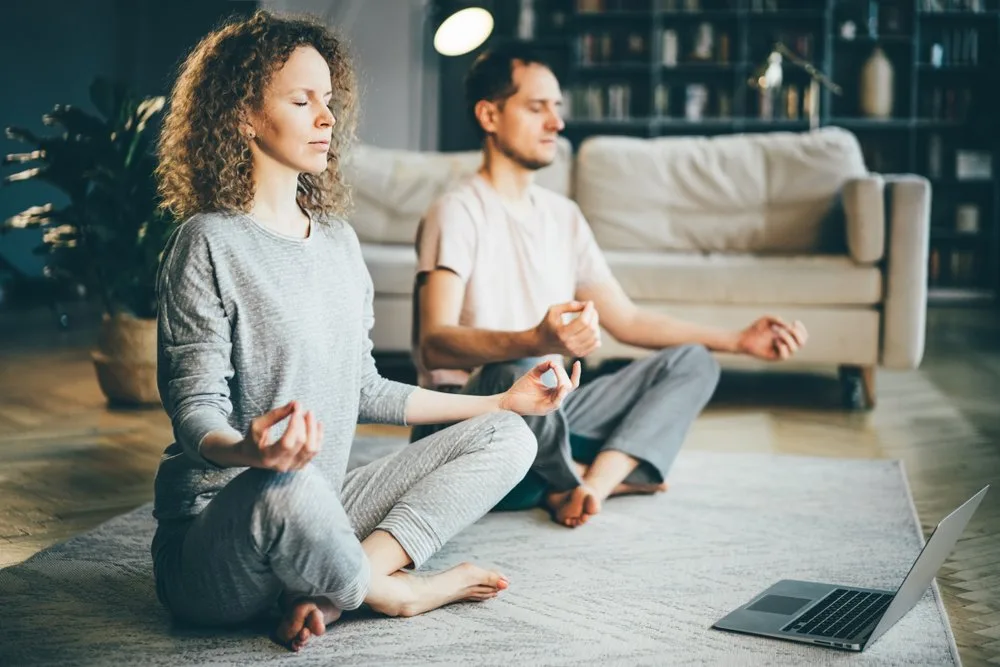Newswise — A Rutgers-led research studies has confirmed the wellness benefits of popular online yoga programs. The researchers found that online yoga significantly reduced anxiety, depression, and stress in hundreds of study participants. The practice also increased their overall well-being and improved their mood.
The longevity benefits of online yoga
“Yoga’s benefits are well-documented, but we wanted to see how these online programs stack up,” said lead author Tracy Chang, an Associate Professor in the Rutgers School of Management and Labor Relations. “What we found is very encouraging. Most participants reported improvements in their mental health in as little as two weeks.”
Online yoga researched during the pandemic
A study published in Applied Psychology: Health and Well-Being measured the effectiveness of online Upa Yoga. The research focused on two specific Upa practices: Yoga Namaskar. This involves standing poses, squatting postures, kneeling forward bends, and arm movements to strengthen the muscles of the hands, legs, and back. It also looked at the impact of Nadi Shuddhi. This is a seated practice that involves alternate nostril breathing and awareness of breath.
At the height of pandemic lockdowns in 2020, Chang and her colleagues recruited 679 college students nationwide. Their objective? To learn and practice three cycles of Yoga Namaskar and four minutes of Nadi Shuddhi at least three days a week by following along with the Isha Foundation’s online videos.
“We used a crossover design and split the students into two groups,” Chang said. “Half the students got started on the yoga right away. The other half, our control group, did not. The yoga group reported improvements during the first four weeks, while the control group saw no change until they started doing yoga in the fifth week.”
What the researchers found
Across the full 12-week study, students reported a significant, sustained reduction in stress. They also demonstrated a cumulative increase in well-being compared to their baseline. In addition, the students reported lower depression and improved mood, though these effects took longer to appear.
The results are encouraging because online Isha Upa Yoga is short, simple, self-paced, and free, Chang said. Since participants saw improvement in just a few weeks, it may be especially helpful for managing short-term stress.

Photo by Kamaji Ogino from Pexels
Another study, published in the Journal of Integrative and Complementary Medicine, evaluated an emerging mind-body behavioral medicine intervention called Inner Engineering Online. The program focuses on self-inquiry, Upa Yoga, and guided meditations.
Increase in vitality, joy and mindfulness
Chang and her colleagues surveyed 347 people who enrolled in the four-week program in late 2018 and early 2019. This is what they found:
Key findings
On average, participants saw a 19% increase in vitality
- A 17% increase in mindfulness
- 14% increase in joy
- Average number of days with sleep disturbances dropped by 25%.
The researchers also measured work-related outcomes in 263 of the participants. On average, they reported a 15% increase in the feeling that their work is meaningful, a 13% increase in work engagement (vigor, dedication, absorption), and a 5% increase in psychological capital (self-efficacy, hope, resilience).
“We analyzed demographic data and found no evidence that the positive effects varied by gender, race, age, education, employment position, or country,” Chang said. “People of different social, cultural, and employment backgrounds benefitted equally.”
However, participants showed no significant improvement in work-related optimism.
Online yoga reduced stress
A Harvard-led study, co-authored by Chang and published by Evidence-Based Complementary and Alternative Medicine, found that Inner Engineering Online significantly reduced stress for participants who were diligent about doing the program routinely.
The researchers recruited 71 employees of an IT firm to complete the four-week program. Only those who spent at least three days a week on the activities, for at least two of the four weeks, saw a therapeutic benefit compared to the control group.
Research References
Online Isha Upa Yoga for Student Mental Health and Well-Being During COVID-19: A Randomized Control Trial by Tracy Chang (Rutgers University), Barbara Ley (University of Delaware), Triya Ramburn (McGill University), Sangeetha Srinivasan (Bioengineering Research Consultant), Sepideh Hariri (Harvard Medical School), Pradeep Purandare (Amalgamated Life Insurance Company), and Balachundhar Subramaniam (Harvard Medical School) appears in Applied Psychology: Health and Well-Being.
The Effect of the Inner Engineering Online Program as a Positive Intervention on Subjective Well-Being and Positive Work Outcomes by Tracy Chang (Rutgers University), Triya Ramburn (McGill University), Sheetal Pundir (McGill University), Pradeep Purandare (Amalgamated Life Insurance Company), and Balachundhar Subramaniam (Harvard Medical School) appears in the Journal of Integrative and Complementary Medicine.
The Effect of Inner Engineering Online (IEO) Program on Reducing Stress for Information Technology Professionals: A Randomized Control Study by Preeti Upadhyay (Harvard Medical School), Tracy Chang (Rutgers University), Sepideh Hariri (Harvard Medical School), S. Rallabandi (Isha Institute of Inner Sciences), Santha Yathavakilla (Isha Institute of Inner Sciences), V. Novack (Soroka University), and Balachundhar Subramaniam (Harvard Medical School) appears in Evidence-Based Complementary and Alternative Medicine.



![women [longevity live]](https://longevitylive.com/wp-content/uploads/2020/01/photo-of-women-walking-down-the-street-1116984-100x100.jpg)










